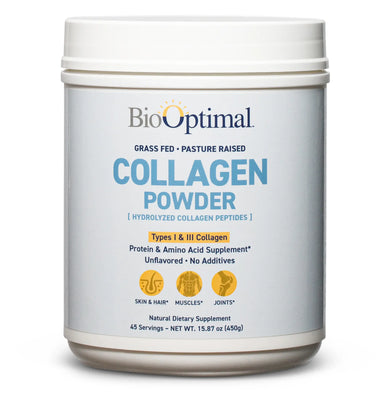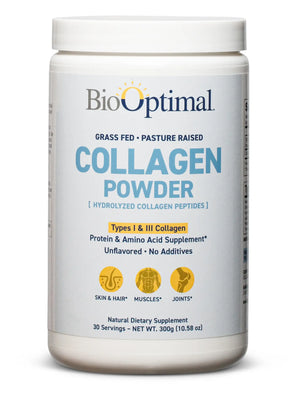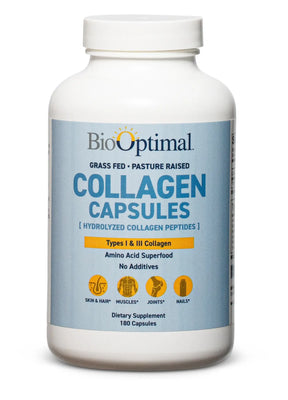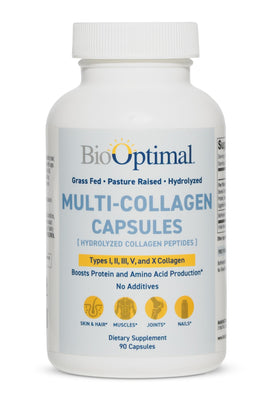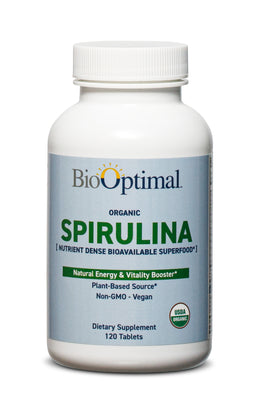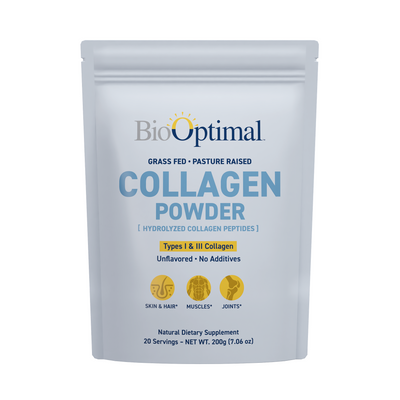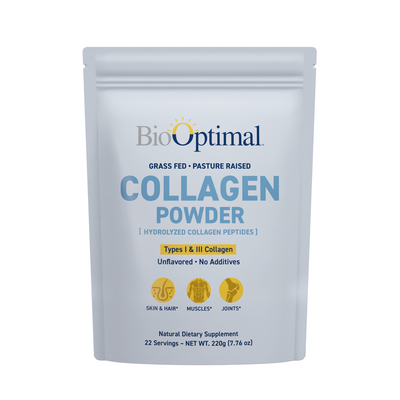Louis's takeaways:
Not all collagen supplements are safe—many may contain harmful heavy metals like lead, mercury, arsenic, and cadmium due to poor sourcing and manufacturing. To protect your health, choose collagen powders that are third-party tested, responsibly sourced (e.g., grass-fed bovine or wild-caught marine), and free from unnecessary additives. Reputable brands like BioOptimal provide transparent lab results and follow strict manufacturing standards to ensure purity and effectiveness. Prioritizing clean, heavy metal-free collagen helps you enjoy the full benefits—healthier skin, joints, and overall wellness—without toxic risks.
Table of Contents:
- Why does Collagen Powder Often Have Heavy Metal Content?
- Why Choose The Best Collagen Powder Without Heavy Metals?
- What Heavy Metals Are Found In Collagen Powder?
- How To Choose The Best Collagen Powder Without Heavy Metals?
- Understanding Collagen Purity and Heavy Metals Testing
- What Side Effects Happen From Heavy Metal Content In Collagen Supplements?
- How Are Collagen Supplements Refined To Remove Heavy Metals?
- BioOptimal Collagen Supplement- Your trusted Collagen Powder without Heavy Metals
- Wrapping Up
Are you worried about heavy metals in your collagen powder? Many supplements claim to support your skin, joints, and overall health, but hidden contaminants like lead, arsenic, and mercury can put your well-being at risk. With so many options on the market, how do you know which ones are truly safe? Choosing the best collagen powder without heavy metals, such as lead, arsenic, and mercury, is crucial to avoid any kind of health complications caused by such impurities.
The key to a safe and effective collagen supplement is transparency. Brands that prioritize third-party testing and responsible sourcing provide the best assurance of purity. But with so many options available, how can you be sure you're making the right choice?
The good news is that you don’t have to compromise on quality or purity. In this guide, you’ll learn how to choose a collagen powder that is rigorously tested for heavy metals, sourced responsibly, and meets the highest safety standards. Protect your health with a supplement you can trust.
Why does Collagen Powder Often Have Heavy Metal Content?
Due to the sourcing and processing of its raw materials, collagen powder can sometimes contain heavy metals. Contaminants like lead, arsenic, or mercury an enter the product if collagen is derived from poorly monitored animal or marine sources. Understanding these risks is crucial when searching for the best collagen powder without heavy metals.
The presence of heavy metals often stems from environmental pollution. Animals and fish, commonly used to make collagen, can accumulate toxins through their diet or habitat. Collagen may retain these harmful substances if not sourced from clean, controlled environments. Additionally, inadequate testing or lax quality control during manufacturing can fail to detect or eliminate contamination. Read an in-depth analysis of collagen research from Medical News Today.
To ensure safety, choose collagen powders verified by third-party testing. Look for brands that source collagen from well-maintained, toxin-free environments and prioritize rigorous quality assurance to provide a safe, clean product for your health.
SUMMARY:
Collagen powder can contain heavy metals due to environmental pollution and poor sourcing from contaminated animal or marine sources. Choosing third-party tested products from clean, well-regulated environments helps ensure safety and purity.
Why Choose The Best Collagen Powder Without Heavy Metals?
Choosing the best collagen powder without heavy metals is essential for protecting your health and maximizing the benefits of this popular supplement. Heavy metals like arsenic, lead, and mercury can harm your body, even in small amounts. Opting for a collagen powder that prioritizes purity ensures you get the nutrients you need without exposing yourself to harmful contaminants.
Protect Your Health from Toxicity
Heavy metals are linked to severe health issues, including kidney damage, neurological disorders, and weakened immunity. Prolonged exposure can also impact gut health and cause inflammation. Choosing a high-quality collagen powder free from heavy metals reduces these risks, allowing you to focus on improving your skin, joints, and hair without compromising your safety.
Maximize the Benefits of Collagen
Collagen supports healthy skin, strong joints, and improved digestion. However, heavy metals in contaminated powders may hinder these benefits by burdening your body with toxins. The best collagen powder without heavy metals ensures your supplement is safe and effective, helping you achieve your wellness goals.
Prioritize Safety with Trusted Brands
Reputable brands take extra steps to guarantee their products meet stringent safety standards. Look for collagen powders that undergo third-party testing to verify the absence of heavy metals. Transparency in sourcing and manufacturing processes is also crucial to finding a product you can trust.
Choosing a safe, high-quality collagen powder allows you to enjoy its benefits while protecting your long-term health.
SUMMARY:
Choosing collagen powder without heavy metals helps protect your health from toxins like lead and mercury. It ensures you get the full skin, joint, and gut benefits without harmful side effects. Always opt for third-party tested, transparent brands to prioritize safety and effectiveness.
What Heavy Metals Are Found In Collagen Powder?
Due to environmental contamination and poor manufacturing practices, heavy metals like arsenic, lead, mercury, and cadmium are sometimes found in collagen powders. These pose significant health risks, so it is vital to select a product tested for purity and safety.
Lead, a common contaminant, is often linked to agricultural soil or water pollution. Even little lead accumulation in the body can cause developmental, neurological, and cardiovascular problems over time. Mercury is another heavy metal that may contaminate marine-based collagen powders, as fish and marine life often absorb mercury from polluted waters.
Arsenic, often present in groundwater, can infiltrate animal or marine sources that produce collagen. Long-term arsenic exposure causes skin conditions and cancer risks. Cadmium, another potential contaminant, is known for its harmful effects on the kidneys and bones.
To avoid these risks, choose the best collagen powder without heavy metals, verified through third-party testing. Choosing collagen powder without heavy metals also helps reduce pain and help with mobility in individuals with osteoarthritis.
How To Choose The Best Collagen Powder Without Heavy Metals?
Choosing the best collagen powder without heavy metals requires careful evaluation of sourcing, testing, and manufacturing practices. By focusing on transparency and quality, you can ensure the supplement is safe and effective. Here’s what to look for:
Prioritize Third-Party Testing
Third-party testing is critical to ensure the collagen powder is free from harmful contaminants. These independent evaluations verify that the product meets safety standards for heavy metals like lead, mercury, and arsenic. Always look for a certificate of analysis (COA) from a reputable lab.
Look for Transparent Sourcing
High-quality collagen comes from clean, well-maintained sources. For bovine collagen, choose products sourced from grass-fed, pasture-raised animals. Look for marine collagen derived from wild-caught fish from unpolluted waters. Transparency in sourcing ensures that raw materials are less likely to contain toxins.
Check the Brand’s Reputation
Brands prioritizing safety and purity often invest in rigorous quality control: research customer reviews, certifications, and the company’s commitment to clean practices. Trusted brands will openly share information about their testing and production processes.
Avoid Artificial Additives
Some collagen powders include unnecessary fillers or artificial ingredients that may mask heavy metal contamination. For better safety, choose products with minimal, natural ingredients.
SUMMARY:
To choose a safe collagen powder, look for third-party testing, transparent sourcing, and a trustworthy brand reputation. Opt for grass-fed or wild-caught sources and avoid products with artificial additives to reduce the risk of heavy metal contamination.
Understanding Collagen Purity and Heavy Metals Testing
When choosing the best collagen with no heavy metals, it’s essential to understand the risks of contamination and contamination risks, including purity. Heavy metals like lead, arsenic, cadmium, and mercury can enter collagen supplements through poor sourcing and manufacturing processes. Long-term toxin-exposure can contribute to serious health concerns, making selecting a thoroughly tested product essential. Product brands use third-party lab testing to verify their collagen is free from harmful contaminants. Look for transparency in testing results, including certificates of analysis (COAs) that confirm purity levels. Sourcing also plays a crucial role—collagen from grass-fed, pasture-raised, or wild-caught sources tends to have lower contamination risks.
Choosing a high-quality collagen supplement that prioritizes purity and testing can support your skin, joints, and overall health without worrying about hidden toxins. Always check for independent lab verification to get the best heavy metals for your wellness routine.
Collagen Testing: Why Heavy Metals-Free Collagen Matters
Not all collagen supplements are created equal. Some may contain harmful contaminants like arsenic, lead, and mercury, poses serious health risks over time. Choosing certified heavy metals-free collagen ensures that your supplement is safe, pure, and beneficial for your body.
Third-party testing is the best way to confirm that collagen is free from toxin—reput toxins-freeride transparency by sharing lab results that verify the absence of heavy metals. Additionally, responsibly sourced collagen—such as from grass-fed, pasture-raised, or wild-caught sources—reduces contamination risks.
When selecting a collagen supplement, look for labels indicating rigorous testing and certifications. Prioritizing certified heavy metals-free collagen helps protect your health while supporting your skin, joints, and overall wellness. Don’t compromise on purity—choose a supplement that meets the highest safety standards.
What Side Effects Happen From Heavy Metal Content In Collagen Supplements?
Heavy metal contamination in collagen supplements can lead to various side effects, affecting multiple body parts. Prolonged exposure to heavy metals can cause toxicity, disrupting vital bodily functions and posing severe health risks. Choosing the best collagen powder without heavy metals is essential to avoid these dangers.
Potential Side Effects Include:
- Neurological Issues- Lead and mercury contain neurotoxins that can impair brain function. Symptoms may include headaches, memory problems, or difficulty concentrating. Prolonged exposure can lead to more severe cognitive and developmental issues.
- Kidney Damage- Cadmium and mercury are harmful to kidney function, potentially causing kidney disease or failure over time with consistent exposure.
- Bone Weakness- Heavy metals like cadmium reduce calcium absorption, causing weaker bones and an increased risk of fractures.
- Digestive Problems- Arsenic exposure may cause abdominal pain, nausea, or diarrhea, affecting overall gut health.
- Cardiovascular Risks- Heavy metals can contribute to high blood pressure, anemia, and other cardiovascular problems.
- Immune System Suppression- Chronic exposure to toxins compromises the immune system, making you susceptible to infections and illnesses.
SUMMARY:
Heavy metals in collagen supplements can lead to serious health issues, including neurological problems, kidney damage, weakened bones, digestive distress, and a suppressed immune system. Choosing a clean, tested collagen powder helps avoid these harmful side effects and supports overall wellness.
How Are Collagen Supplements Refined To Remove Heavy Metals?
Collagen supplements undergo several refinement processes to minimize heavy metal content. Filtration and purification techniques, such as molecular distillation and activated carbon filtration, are commonly used to remove impurities. Manufacturers may also use enzymatic hydrolysis to break down collagen into peptides while discarding contaminants.
Sourcing from clean environments and testing raw materials for heavy metals further reduces the risk of contamination. Third-party lab testing is critical to ensure final products meet safety standards. These measures make the collagen supplement as pure as possible, aligning with safety requirements and protecting consumers from harmful toxins.
Does the Process Affect the Quality of the Supplements?
Proper refining methods do not compromise the quality of collagen supplements. Advanced technologies are designed to preserve the bioactive properties of collagen peptides while eliminating contaminants. For example, hydrolysis improves collagen's absorption in the body without altering its effectiveness. However, over-processing or poor refinement techniques can degrade the product’s amino acid profile, reducing its benefits. Reputable brands carefully balance purification with maintaining collagen’s structural integrity. By choosing the best collagen powder without heavy metals, you can enjoy a safe and effective supplement providing full health benefits without unnecessary risks.
What Are The Manufacturing Standards Followed By Reputed Collagen Supplement Producers?
When choosing a high-quality collagen supplement, it’s essential to consider the manufacturing standards followed by reputable brands. These companies prioritize verified collagen safety to ensure their products are free from contaminants and contaminant-free industry standards. Key manufacturing standards include:
- Third-Party Testing – Independent labs test for heavy metals, microbes, and other contaminants to ensure verified collagen safety.
- Good Manufacturing Practices (GMP) – Reputable producers follow strict GMP guidelines to maintain product consistency and quality.
- Sourcing Transparency – High-quality collagen comes from responsibly raised, grass-fed, pasture-raised, or wild-caught sources to minimize contamination risks.
- Non-GMO and Allergen-Free Certification – Many trusted brands ensure their collagen is free from common allergens, synthetic additives, and GMOs.
- Certificates of Analysis (COAs) – Reliable manufacturers provide COAs to confirm purity, potency, and safety.
By choosing a collagen supplement that meets these standards, you can be confident in its quality, effectiveness, and verified collagen safety.
BioOptimal Collagen Supplement- Your trusted Collagen Powder without Heavy Metals
When it comes to collagen, purity matters. BioOptimal Collagen Supplement is your trusted choice for a collagen powder without heavy metals, ensuring safety and effectiveness in every serving. Our collagen is rigorously tested for heavy metals and contaminants, giving you peace of mind that you’re getting a clean, high-quality product.
Low-quality supplements can contain heavy metals like lead and mercury, which can pose various health hazards. That’s why we prioritize transparency and third-party testing to confirm that our collagen meets the highest safety standards. Sourced from premium, responsibly raised cattle, BioOptimal Collagen is free from harmful additives and unwanted toxins.
Support your skin, joints, hair, and overall wellness without worrying about hidden contaminants. Choose BioOptimal Collagen Supplement, a collagen powder without heavy metals, and feel confident in the purity of your daily supplement. Your health deserves the best—without compromise. Learn more about our testing process here.
SUMMARY:
BioOptimal Collagen Supplement offers a clean, third-party tested collagen powder free from heavy metals like lead and mercury. Sourced from responsibly raised cattle and free of harmful additives, it supports your health with purity you can trust.
Wrapping Up
Selecting the best collagen powder without heavy metals is crucial for protecting your health and maximizing the benefits of collagen supplements. You can confidently choose a safe, effective product using third-party testing, transparent sourcing, and quality manufacturing practices. Prioritizing purity ensures you enjoy collagen’s benefits—like improved skin, joint, and gut health—without unnecessary risks.
At BioOptimal, we’re committed to providing high-quality collagen supplements you can trust. Our products get tested to ensure safety and purity. Invest in premium collagen powders and take the first step toward healthier living. Read our expert reviews on collagen supplements.
FAQ
1. What is the safest collagen to take?
The safest collagen comes from clean, well-sourced materials like grass-fed bovine or wild-caught marine collagen and is verified by third-party testing for heavy metals.
2. Who should avoid collagen powder?
Individuals with allergies to the source (e.g., fish or bovine) or those with specific dietary restrictions should avoid collagen powder unless advised by a healthcare provider.
3. What metals are found in collagen supplements?
Due to environmental contamination, some collagen supplements have elements like arsenic, lead, mercury, and cadmium.
4. Do collagen capsules also have heavy metals?
Yes, collagen capsules can also contain heavy metals if the raw materials are contaminated or the product lacks proper safety testing
5. How Is Collagen Tested for Heavy Metals?
Collagen is tested for heavy metals through third-party laboratory analysis using methods like ICP-MS (Inductively Coupled Plasma Mass Spectrometry). This detects trace contaminants like lead, arsenic, mercury, and cadmium. Reputable brands provide Certificates of Analysis (COAs) to confirm their collagen is free from harmful toxins.
6. What Certifications Verify Collagen Purity?
Certifications like NSF, GMP (Good Manufacturing Practices), and ISO 17025 ensure collagen is produced under strict safety standards. USDA Organic and Non-GMO Project Verified indicate clean sourcing, while third-party lab testing certifications confirm purity. Look for brands that share transparent lab results for verified heavy metal-free collagen.
7. How Can I Be Sure This Collagen Powder Is Heavy Metals-Free?
Check if the brand provides third-party lab test results or a Certificate of Analysis (COA) confirming heavy metal levels are within safe limits. Choose reputable brands that follow GMP standards and undergo independent testing. Avoid unverified supplements, and prioritize transparency in sourcing, manufacturing, and lab testing reports.


